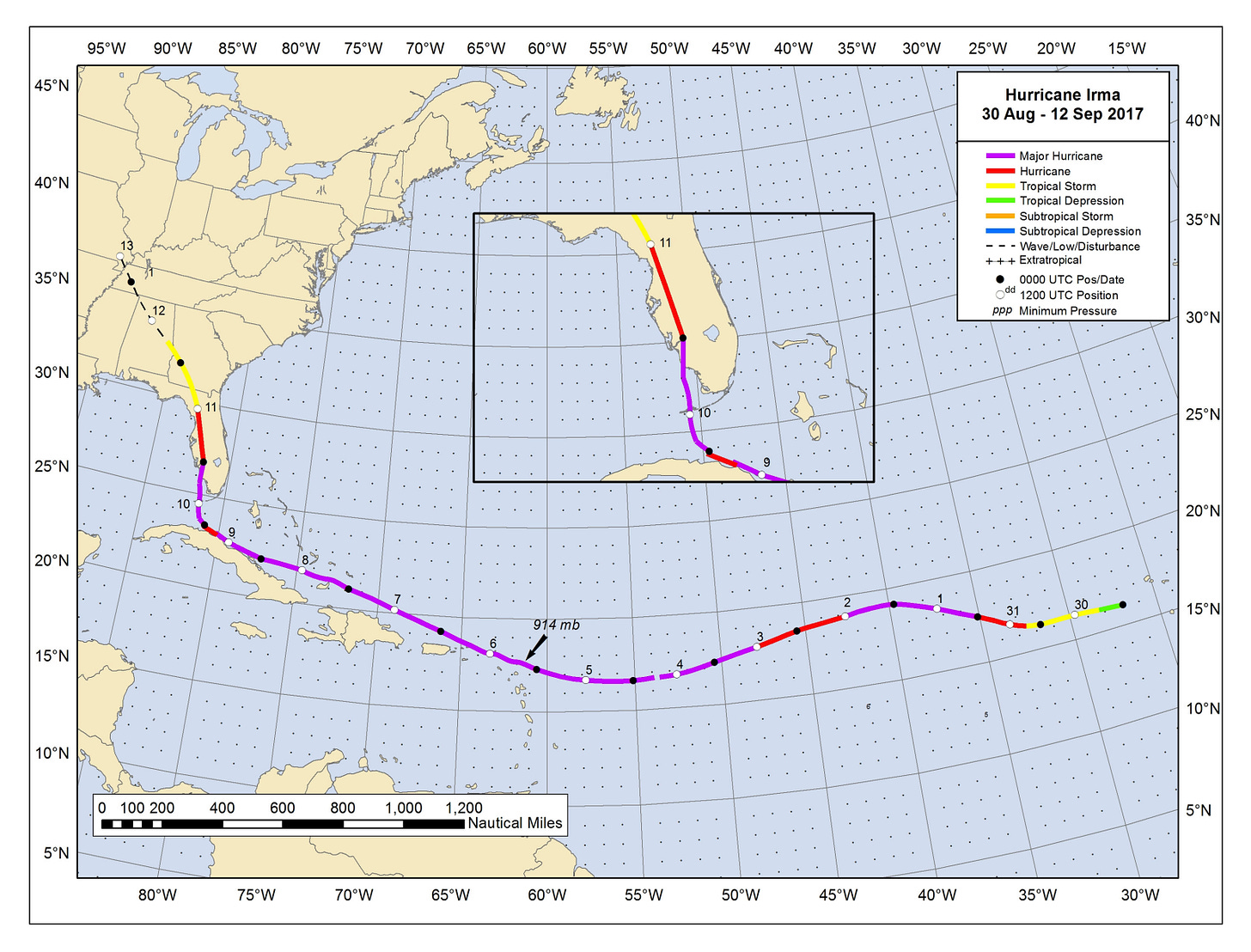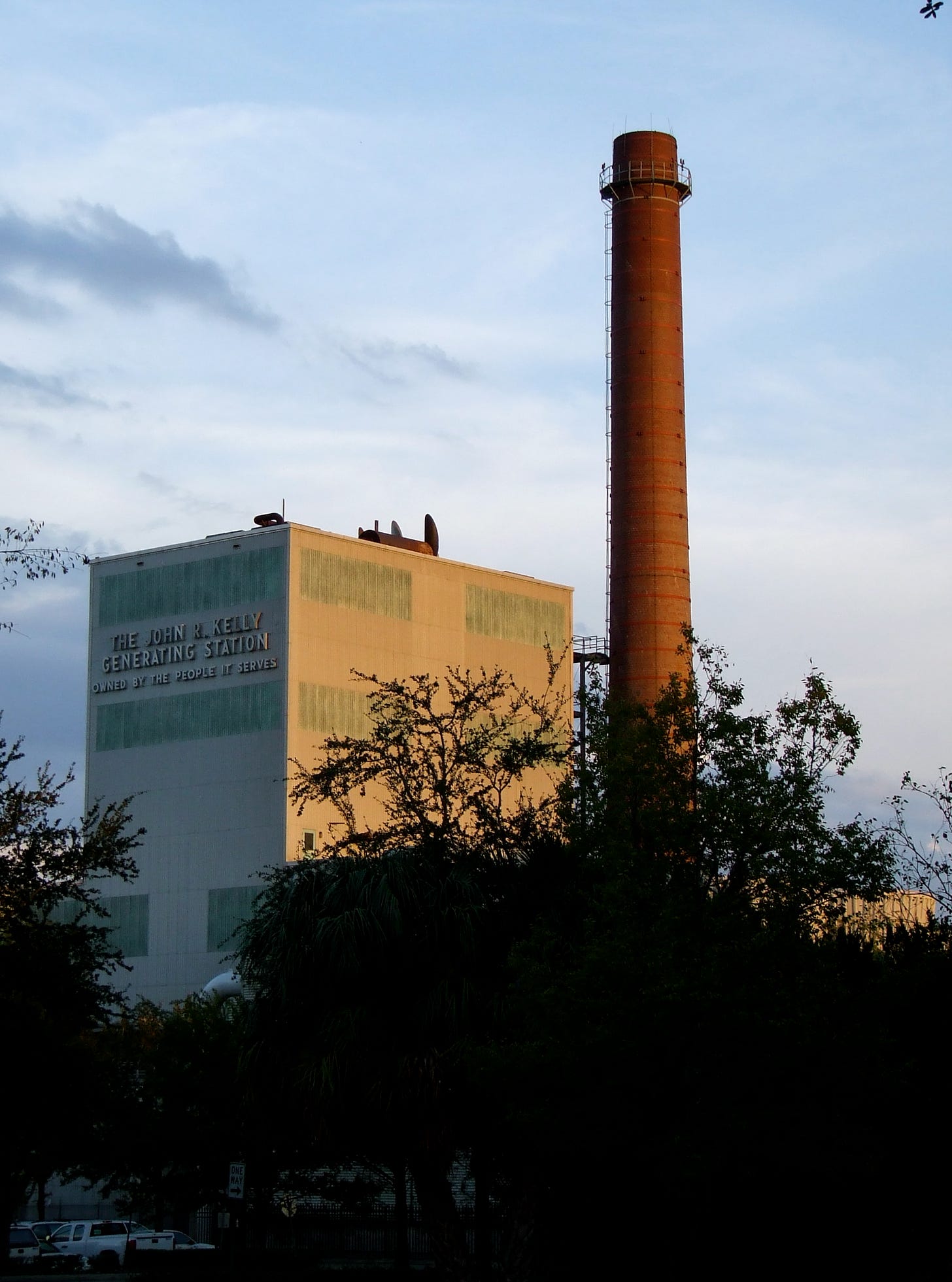The Florida Legislature is working on a bunch of favors for big power companies
The Trade Show (2023 ed.), Vol. 13

This is “The Trade Show,” a weekly collection of shorter news nuggets and stories from other outlets around the state and country about the special interest-driven issues that lawmakers spend most of their time working on. The name comes from something a mentor once told me before I covered my very first session of the Florida Legislature more than 20 years ago: “Ninety percent of what goes on up here is a trade show.” As always, our content here at Seeking Rents is free to all readers. But please consider a paid subscription to support our work, if you can afford one
In September 2017, not long after Hurricane Irma hit Florida and knocked out power to nearly 7 million electricity customers, a group of residents sued the state’s biggest power company.
The lawsuit accused Florida Power & Light of failing to adequately protect its systems against big storms — by not replacing decaying utility poles, for instance, or leaving tree limbs dangling over power lines — even though the company was charging its customers money for hurricane hardening.
Alleging breach of contract and gross negligence, the lawsuit demanded that FPL pay damages to cover the cost of spoiled food, loss of income and other injuries and expenses.
That case has been percolating in Florida court more than five years. But it just became a much bigger threat to FPL: An appellate court ruled last month that the case against FPL could go forward as a class-action suit.
So now the Florida Legislature is rushing in to help.

Last week, during a meeting of the Appropriations Committee in the state House, lawmakers slipped an amendment into a bill that would shield FPL and other power companies from lawsuits following hurricanes or other emergencies.
Specifically, the amendment — which was attached to a bipartisan bill dealing with hurricane cleanup and recovery — would save utilities from having to pay damages stemming from post-disaster power outages.
It would also require any disputes over whether a power company adequately prepared for a hurricane to be resolved by the governor-appointed Public Service Commission — instead of the courts. That’s the same PSC that industry watchdogs say has been so co-opted by the power companies that they have deemed it a “captured agency.”
(It might not surprise you to learn that FPL tried and failed to kill the Hurricane Irma lawsuit by claiming the case should be handled by the PSC.)
Now, this legislation (House Bill 7057) should not disrupt the class-action suit FPL is fighting right now. But it would protect the company against any similar lawsuits in the future.
It would also shield the state’s other big power companies — Duke Energy Corp. and Tampa Electric Co. — both of whom have tried to help FPL fight off the Irma suit by attempting to file supportive legal briefs.
Higher prices, privatized systems
Shielding FPL, Duke and TECO from lawsuits isn’t the only favor Florida lawmakers may do for the power companies this session.
Another piece of legislation closing in on the finish line would make it easier for the companies to profit off investments in so-called “green hydrogen” and “renewable natural gas.” The bills (House Bill 821 and Senate Bill 1162) have faced opposition from consumer groups like AARP, who warn that they will lead to higher monthly electric bills, and environmental groups, who say that renewable natural gas is a far dirtier fuel source than its greenwashed name implies.

Then there are bills that would make it easier for utility companies to buy water systems by letting them pay higher purchase prices and pass the acquisition costs onto their customers. The bills (House Bill 125 and Senate Bill 194) are likely to prompt privatization of more publicly-owned water utilities — at a time when FPL’s parent company, Fortune 500 giant NextEra Energy Inc., has been trying to buy water systems in other states.
And yet another proposal would make it harder for city-owned electric companies to pay dividends into their city’s general fund, where the money could pay for community needs like parks and police.
Oddly, the bill (House Bill 1331) would not set any similar restrictions on dividends that private power companies pay to their shareholders.
It’s worth noting that making it less attractive for a city to own its own power company makes it more likely that the city would be willing to sell it to a private company — and that the last time similar legislation surfaced in the Florida Legislature was right around the time FPL was trying to buy the city of Jacksonville’s electric utility.
Tax breaks and earmarks
But wait. There’s more!
Another late-session amendment slipped onto a bill last week would make it harder for cities or counties to regulate power companies when they replace or enlarge electrical substations (House Bill 439).
Meanwhile, tucked inside the $1 billion-plus tax packages moving through the House and Senate is a tax break for companies that produce renewable natural gas. Records show that proposal comes from Delaware-based energy firm Chesapeake Utilities Corp., the parent company of Florida Public Utilities Co.
Both tax plans (House Bill 7063 and Senate Bill 7062) also include a provision that would extend an about-to-expire tax break for natural gas that’s used as fuel for vehicles. The supporters of the tax break include the Florida Natural Gas Association, which represents Chesapeake; FPL’s Florida City Gas; and TECO’s People Gas.
And someone in the Legislature has drafted a proposed tax break for giant batteries — the kind used by utilities for backup power. That tax break hasn’t yet surfaced in any amendments or bills.
Plus, deep down in the Florida Senate’s $113.8 billion is a $500,000 earmark to help fix road-flooding problems in front of FPL’s corporate headquarters in Juno Beach.
And a Gainesville power grab
And then there’s what may be the most ominous measure of all: House Bill 1645, which was just publicly introduced last week, during the seventh week of Florida’s nine-week session.
That bill that would strip control of publicly owned Gainesville Regional Utilities, or GRU, away from local city commissioners — and give control to a new board appointed by Florida Gov. Ron DeSantis.

Opponents suspect it is part of a plot to privatize GRU. The former mayor of Gainesville said recently that FPL has expressed interest in buying some or all of GRU. And FPL is part of a bid to build a new power plant at the University of Florida.
Supporters — led by Rep. Chuck Clemons (R-Newberry) — say the DeSantis board wouldn’t have the power to sell GRU. But opponents worry the board would be used to pressure city leaders into selling — perhaps by cutting dividends to the city’s general fund or by jacking up rates in order to drive dissatisfaction with GRU.
Sure, those kinds of tactics might make some local voters angry with DeSantis. But Florida’s far-right governor may not see much to fear from a backlash in deep-blue Gainesville.
Power and money
In case you were wondering, state records show that Florida Power & Light, Duke Energy, TECO and Chesapeake have together made more than $1 million in campaign contributions just in the first three months of this year.
That includes at least $450,000 to the Republican Party of Florida and related funds controlled by GOP leaders in the Legislature.
But it also includes at least $110,000 to the Florida Democratic Party and related funds controlled by Democratic legislative leaders.
Tourism lobbyists at work, part one
A few weeks ago, the Florida House of Representatives introduced a bill to combat sex trafficking.
The legislation (House Bill 7045) would have allowed trafficking victims to sue a hotel or other business used in their exploitation, if that business had failed to take basic precautions.
But the House recently watered down that bill so that it no longer includes hotels. It would only apply to strip clubs now.
Read: Hotels removed from Florida bill that allows lawsuits over sex trafficking (South Florida Sun-Sentinel)
Tourism lobbyists at work, part two
A few weeks ago, the Florida House of Representatives introduced a bill to cut down on corporate tax subsidies.
The legislation (House Bill 5) would have eliminated several broken tax breaks — including one incentive program that was supposed to help struggling communities but has instead been repeatedly exploited by theme-park giant Universal Orlando.
But the House recently watered down that bill so that it would no longer touch the high-crime tax break. Which means that Universal could pocket nearly $4 million more in tax breaks very soon.
Read: The worst tax break in Florida (Seeking Rents)
Trumpism…with competence?
The New York Times reports that the DeSantis administration rushed a $1 million cruise-ship contract out the door during a recent immigration operation — without first checking whether the ship could be used.
It couldn't. But DeSantis won't say whether taxpayers still paid.
And while you read that story, remember that DeSantis staffers also hid details about how they spent taxpayer money during their Martha’s Vineyard migrant-relocation stunt last year — the same stunt in which a top aide used a pseudonym email account to coach a former client on how to get the contract.
Read: A Cruise Ship for Florida’s Migrant Crisis Had Nowhere to Dock (The New York Times)
Sympathetic and dangerous
There’s a bill moving through the Legislature this session (Senate Bill 404) that would prevent members of the public from obtaining the autopsy reports of children killed in acts of domestic violence. These autopsy reports are public records under Florida’s expansive “Government in the Sunshine” laws.
This is an incredibly sympathetic idea. No one wants to re-traumatize grieving family members when gruesome details of the kid’s death are published in a newspaper, by a television station or somewhere online.
But it is also a very dangerous idea. That’s because autopsy reports are crucial documents when it comes to exposing failures at Florida’s notoriously secretive foster-care agency.
Read: Newly proposed public records carve-out could protect Florida DCF from scrutiny, critics say (Miami Herald)




This state is rotting from the inside out. So tired of watching the damage & hardship DeathSantis & his GOP lapdogs are causing, & how they’re using divisive, ugly & corrupt politics to do it
Florida deserves the government that it voted for I suppose, but it is incredibly sad to see the state that my family has called home since at least 1840 destroyed at such a rapid pace. The accelerating decline began when Floridians apparently elected pRick Scott to be our Governor, despite the fact that he had coordinated the theft of ~$75 billion from the poor, the sick, and the elderly in the biggest medicare/medicaid fraud scheme in US history. Scott's criminal gang, the Republican Party of Florida, moved quickly to lock in their power and silence all dissent by illegally gerrymandering a permanent majority for their gang. They have stolen billions from Floridians and wasted billions more enriching their friends and relatives with taxpayer funds, all the while chipping away at our rights and our ability to do anything to stop them. Every elected Republican in Florida's state government should probably be in prison, but they will never be held to account. Just like Rick Scott, they will never even be charged for their massive crimes simply because they are rich, white Republicans.